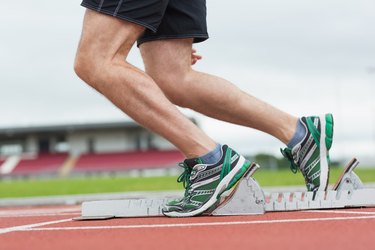
Wearing a speed parachute during your sprinting workouts adds an element of resistance that your hips and legs have to overcome. How fast you can sprint is dependent on your technique and explosiveness in your glutes, quadriceps, hamstrings and calves. The speed parachute is a good option for advanced sprinters to overcome a plateau. However, it has the potential of adversely affecting younger sprinters who are still working on technique.
Increases Sprinting Speed
Video of the Day
The resistance that speed parachutes provides forces your glutes, quadriceps, hamstrings and calves to contract with greater explosiveness. When you're wearing a parachute, the chute doesn't open until you've picked up a bit of speed. While the tool won't necessarily help with improving acceleration, it is effective at improving performance during the drive phase of sprinting, which is after you've taken off and are working to reach your top speed.
Video of the Day
Limitations of Speed Parachutes
Wearing a speed parachute has the potential of adversely affecting your sprinting technique. Because of this, according to Jeremy Sheppard of the Physiology Department of Australian Institute of Sport, resisted sprinting tools like a speed parachute should only be used by athletes who are physically mature. When you wear a speed parachute, it could cause you to increase the amount of time your feet are in contact with the ground and increase how far you are leaning forward. Therefore, to avoid causing problems in your sprinting biomechanics, master sprint technique before incorporating speed parachute training.